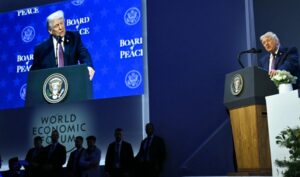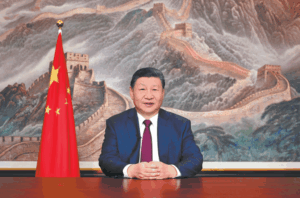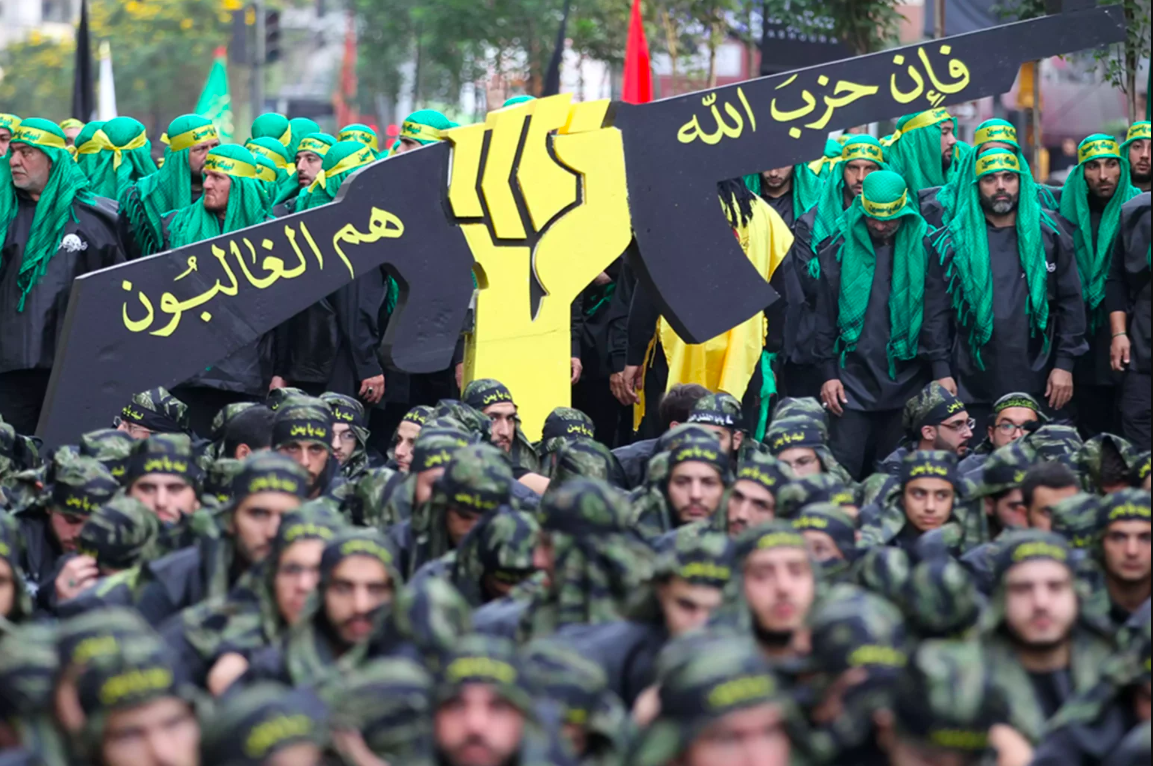
Published 06/19/2024 17:19 | Edited 06/19/2024 17:21
The recent increase in tensions on the border between Israel and Lebanon reached a new level this Tuesday (18), when Israeli Foreign Minister Israel Katz threatened the Lebanese group Hezbollah with an “all-out war”. The threat arises in a context of intense clashes between Hezbollah and Israeli forces, concomitantly with Israel’s attacks on Gaza, under the justification of eradicating Hamas.
Katz’s statements came after Hezbollah released images captured by a drone flying over Haifa, an important port city in northern Israel. In the video, Hezbollah identifies military, energy and civilian targets, increasing pressure on the already volatile border. Since the start of the war between Israel and Hamas on October 7, the region has been the scene of almost daily clashes, resulting in the deaths of 473 people in Lebanon and 26 in Israel, including civilians and military personnel.
In an interview with Red PortalEmir Mourad, secretary general of Coplac (Palestinian Latin American and Caribbean Confederation), offered a critical perspective on the situation, suggesting that Katz’s threats are widely perceived as bluffs, both by analysts and members of the international community.
For Emir Mourad, Israel’s threats are empty and do not represent a real danger of escalating into a full-blown conflict. Mourad argues that Israel is unable to open a new front against Hezbollah and that the United States, Israel’s main ally, is more interested in preserving Israel’s security than in promoting a large-scale conflict.
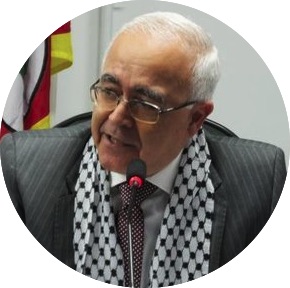
“That’s a bluff. Israel is not in a position to open a front against Lebanon, and the United States does not want that to happen. Hezbollah is prepared and has a database of targets inside Israel, as shown in the recent video from Haifa,” says Mourad. He also highlights that Hezbollah acts in solidarity with Gaza and that any intensification in Lebanon is directly linked to the conflict in Gaza.
He highlights that the history of conflicts on the border between Israel and Lebanon has always involved a security strip within Lebanese territory, but now this dynamic has changed. Mourad points out that the border region is currently unoccupied by Israeli settlers and that Hezbollah has consistently destroyed Israeli radars and defense posts, weakening Israel’s ability to monitor and respond to attacks along these approximately ten km of border. He recalls that Iran recently attacked Israel from a distance of more than 2,000 km.
Emir Mourad’s analysis suggests that Israel’s threats of all-out war against Hezbollah are more political rhetoric than a practical strategy. Mourad emphasizes that Katz’s threats serve more an internal purpose of appeasing Israeli public opinion than a viable military strategy.
Hezbollah leader Hassan Nasrallah responded to Katz’s threats in a defiant manner, indicating that the group is prepared for any conflict and reiterating its support for the resistance in Gaza. “You are most welcome if you want war,” Nasrallah said. Hezbollah conditions the end of its actions on the border to the end of the war in Gaza, showing that solidarity with the Palestinian resistance is the main driver of its operations.
A report by the Counterterrorism Institute at Reichman University assessed the consequences for the State of Israel in the event of an “all-out war” with Lebanon. The conclusions released by the Israeli website CalcalistTech indicate that the Zionist State would suffer devastating impacts, especially due to the military capabilities of the Hezbollah movement. The Israelis also claim that there would be a regional mobilization of “all representatives of Iran”, as they generally coin Arab anti-imperialist movements, such as the Resistance in Syria, Iraq, Yemen, together with the Palestinian groups Hamas and Islamic Jihad in Gaza.
A project of continuous destruction
When commenting on Katz’s statement, Ualid Rabah, president of the Palestinian Arab Federation of Brazil (Fepal), prefers not to ignore the threat, as he sees it more as a statement from the USA than from Israel. He offers a more comprehensive view, criticizing the role of the West and Israel in destabilizing the Middle East.
Ualid Rabah’s analysis paints a grim picture of Israeli and Western intentions in the Middle East, positioning recent threats of war as part of a larger strategy of domination and destruction. His comments underscore the urgency of an international response to prevent further humanitarian tragedies and promote true and lasting peace in the region.
Rabah sees Katz’s threat as part of an ongoing effort to impede sustainable development and peace in the region. He emphasizes that the West, led by the United States, does not want the Middle East to stabilize, especially with the recent inclusion of countries such as Egypt, Saudi Arabia and Iran into the BRICS.
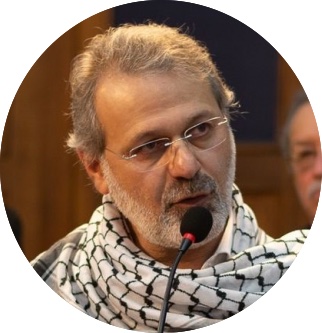
“The genocide promoted in Gaza is proof that they have no limits. If Israel continues with these threats, the world must react in a similar way to what it did against Nazism, declaring war on Israel. It is time to make Zionism disappear from the face of the earth, just as we did with Nazism”, declares Rabah.
Rabah argued that Israel’s actions are part of a broader Western-sponsored plan to destabilize the region. According to him, Israel’s threats cannot be seen in isolation. “This is not Israel’s speech itself, this is the West’s speech in a gradual and continuous process of destruction of the Middle East,” he stated.
Rabah highlighted that countries such as Egypt, Saudi Arabia and Iran have recently joined BRICS, a move that threatens the West’s monopoly of power. “The West and the United States, with Israel as their bridgehead, do not want the Middle East to enter a multipolar world,” he explained.
The president of Fepal was emphatic in denouncing Israel’s actions in Gaza, describing them as genocide. “The genocide carried out in Gaza proves that they have no limits in pursuing this goal,” he said. He argued that the devastation in Gaza is a prelude to what could happen in Lebanon, citing the massive destruction and high civilian mortality as evidence of a systematic campaign of violence.
“The greatest destruction in war of all time, 75% of Gaza destroyed in just over 200 days, will also do so in Lebanon”, warned Rabah. He called on the international community to pay attention to Israel’s threats and act to prevent a new humanitarian catastrophe.
Rabah compared the current situation to fighting Nazism in World War II, arguing that the world must take an equally firm stance against Zionism. “It is time to make Zionism disappear from the face of the earth, as we made Nazism disappear,” he declared. He called for the Israeli regime, which he described as supremacist, racist and ethnically cleansed, to be paralyzed by any means possible.
For Rabah, allowing Israel to continue its actions would mean the destruction of yet another country and another people in the Middle East, something he considers unacceptable. He concluded by calling for a robust international response to protect human rights and ensure peace in the region.
Situation on the ground
The Israel-Lebanon border remains highly tense, with almost daily exchanges of fire. The visit of Amos Hochstein, special envoy of United States President Joe Biden, to Beirut indicates a diplomatic effort to reduce tension. However, aggressive rhetoric from both sides suggests the conflict could intensify further if there is no significant breakthrough in peace talks.
Israel’s threats against Hezbollah and the group’s combative response indicate a scenario of uncertainty and potential escalation. While figures like Mourad and Rabah offer perspectives on the viability and motivations of these threats, the reality on the ground continues to be marked by violence and instability. The international community, especially the United States, plays a crucial role in trying to mediate and prevent a wider conflict.
Source: vermelho.org.br
